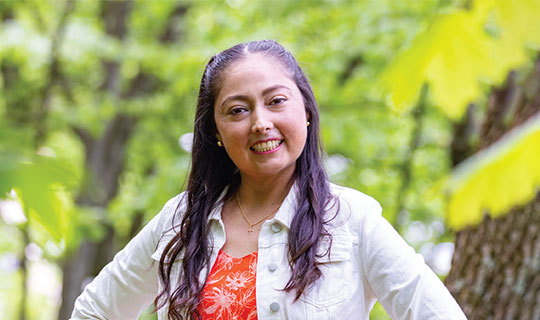“Getting a transplant has changed my life completely. I am very grateful.”

At first, Marcela Urrego’s doctors didn’t know what to think when she developed shortness of breath and severely swollen hands and ankles. Was it a thyroid problem? A liver condition? Continued investigation finally produced a startling diagnosis. In 2019, the 42-year-old mother and Boonton resident was diagnosed with scleroderma, a rare type of autoimmune disease in which the body’s immune system attacks healthy tissues.
“I had thought it was just a skin problem,” says Marcela. “When I started reading about scleroderma, I learned what a bad disease it is.”
Scleroderma causes abnormal tightening of the skin, which can affect internal organs. In the lungs, it can trigger inflammation and scarring, called pulmonary fibrosis, which makes breathing difficult.
Marcela’s condition seriously worsened, and in March 2021, she was put on supplemental oxygen 24 hours a day, an anxiety-provoking situation. She required a wheelchair to get around. “I was in bed almost all the time,” she says. “I couldn’t take a shower by myself; somebody had to help me.”
It was clear she needed highly specialized care, and Marcela’s doctors referred her to the Advanced Lung Disease and Transplant Program at Newark Beth Israel Medical Center (NBI), a Center of Excellence for Lung Transplantation and New Jersey’s only lung transplant center.
Hoping for a Transplant

The team at NBI determined that Marcela also had severe pulmonary artery hypertension secondary to the scleroderma and that she was a good candidate for a lung transplant. “She was very likely to benefit from the procedure by having a better quality of life and living longer,” says Joshua Lee, MD, Lung Transplant Medical Director. “Her goal was to be able to spend more time with her 22-year-old son and her extended family in Colombia.”
But Marcela faced several challenges. “Her scleroderma had affected her esophagus,” says Dr. Lee. “That meant that after a lung transplant, she had a higher risk of aspirating [breathing in] food, which could increase Marcela’s risk of developing a graft injury and chronic rejection of her new lungs.” Such an injury could cause the transplant to fail.
To reduce the risk of aspiration, Marcela would need to eat through a feeding tube for a period of time after her transplant as her body adjusted to the new organs. “This is a big challenge for many patients, but she didn’t even hesitate,” says Dr. Lee. “She was willing to sacrifice in order to get through the transplant.”
Yet there was another serious concern. In November 2021, Marcela contracted COVID-19 and a severe form of pneumonia common in people with scleroderma. She was hospitalized for 10 days.
“COVID didn’t have as dramatic an effect on her lung function as we’ve seen in some patients,” says Dr. Lee. “But we had to make sure that she was able to overcome the infection before even thinking about a transplant.”
She was finally placed on the transplant list in September 2022—and the wait for a donor organ began.
A Life-Changing Surgery

The call that would change everything came on February 14, 2023—Valentine’s Day. A fresh set of lungs was available, and Marcela’s family rushed her to the hospital. “I was happy but scared,” she says.
While her son and parents kept vigil in the waiting room, Marcela had bilateral lung transplant surgery performed by Jesus Gomez-Abraham, MD, Lung Transplant Surgical Director.
It was one of the first cases in New Jersey where doctors used the ex vivo lung perfusion (EVLP) system, a highly specialized lung bioengineering organ preservation system. NBI is among several programs in the U.S. that participated in EVLP research and FDA-approved clinical trials—important milestones for the only lung transplant center in New Jersey.
When the surgery was complete, Marcela looked out the window from her hospital bed and thought, “Thank you, Lord.”
Marcela slowly regained strength. No longer tethered to an oxygen tank, she breathes freely.
Immunosuppressive medications that Marcela takes to prevent her body from rejecting her new lungs have calmed her overactive immune system. In April, she even passed a high-altitude simulation test at Cooperman Barnabas Medical Center, clearing her for travel to visit relatives in Colombia.
“She can now eat, drive, shop and do activities that she couldn’t have dreamt of doing before her transplant,” says Dr. Gomez-Abraham. “She is doing very well and enjoying the gift of life.”
“The first year after transplant is crucial,” says Dr. Lee. “If patients can get through it without major issues, their survival prospects and prognosis become better. And Marcela has done that.”
He credits Marcela’s success to the multidisciplinary team who are involved in the transplant process, from procurement of lifesaving organs to post-transplant rehabilitation.
“It’s really a team effort that includes our nurse coordinators, nurse practitioners, pharmacists, social workers, transplant surgeons, anesthesiologists, therapists, nurses and many others,” says Dr. Lee. “We work collaboratively to make sure our patients have the best possible outcomes.”
“We provide not just the transplant, but also a conglomeration of multispecialty and multidisciplinary services that are needed in conjunction with transplants—an approach that makes us successful,” says Dr. Gomez-Abraham.
“Getting a transplant has changed my life completely,” says Marcela. “I am very grateful.”
Learn more about lung transplants at RWJBarnabas Health.
 View full issues of Healthy Together magazine by New Jersey region:
View full issues of Healthy Together magazine by New Jersey region: